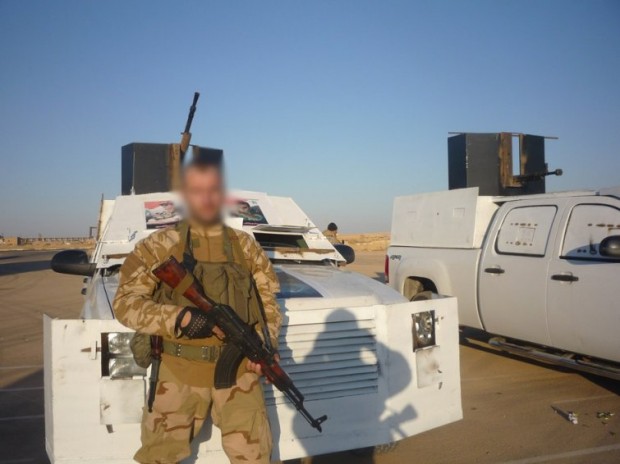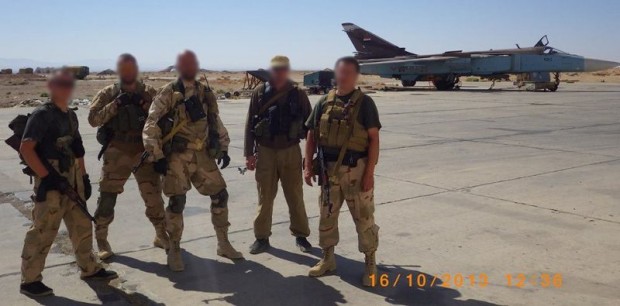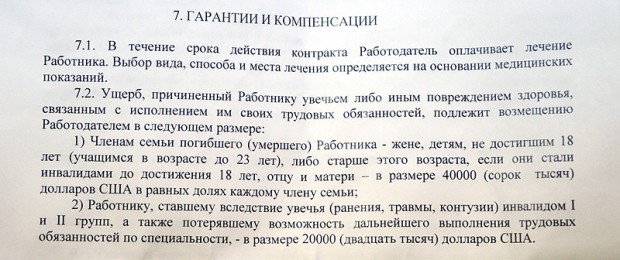A Syrian rebel group claims that it has ambushed and killed a group of Russian mercenaries who may have been working for a Chinese security contractor. The jihadist fighters from an Al Qaeda affiliate “Islamic State of Iraq and al Sham (ISIS)” claim to have killed the mercenaries in a battle near Homs. At least one of the mercenaries, however, has been videotaped alive and well, and living back in Russia.
The large and well-respected St. Petersburg newspaper, Fontanka, has published an article, translation by The Interpreter, entitled “St. Petersburg Sends Contractors to Syria.” It details the investigation that uncovered the existence of Russian mercenaries defending sensitive installations important to the Assad government in Syria. The contractors appear to have been recruited in St. Petersburg by a company based in Hong Kong.
We also know that the mercenaries appear to have been operating in As-Sukhnah, east of Palmyra, on the road between Deir Ez Zor and Homs. Jihadists have long wanted to capture the town, and nearby Palmyra, because securing this road would link their forces from the east to the west. The Assad regime, on the other hand, has had difficulty sparing the resources to defend the position, as it is far away from the major cities which are heavily embattled. According to the initial investigation by Fontanka, the mission of the mercenaries was to secure key regime assets, away from the front lines, in order for Assad forces to concentrate on removing “bandits” in other areas. However, it appears that the oil fields that the Russians were supposed to be guarding were in rebel control, and the team was really tasked with getting them back.
The following translation is an update from Fontanka. It says that one of the key players in the military contracting company is a reservist officer in the Russian Federal Security Service (FSB), lieutenant colonel Vyacheslav Kalashnikov. The FSB, therefore, were aware on some level that the Moran Security Group was sending Russian mercenaries to Syria to fight for Assad. However, the mercenary group was shut down and several mercenaries were arrested upon their return to Russia. A major Russian contractor says that this was not an FSB mission, but a mission designed to look like an FSB mission. The insinuation is that a pro-rebel group hired the Russians in order to lead them into a trap, kill them, and show their bodies on television.
All of the pictures on the original Fontanka article were also posted in the one we already translated. Instead, these pictures of the Russian mercenaries were posted on a Russian social network (except the one that states it was from Fontanka). – Ed.
For the first time in the history of Russia, the FSB has made arrests for the exotic criminal charge of mercenary activities. Having attempted to form a two thousand strong “Slavonic Corps” on Syrian soil, the executives of a private military company from St. Petersburg have wound up in the cells at Lefortovo. The rank and file soldiers of fortune having been telling Fontanka about their first and last battle. Unhappy at the loss of their commanders; they now have no one to ask for remuneration for their unpaid service in the war.
We’ve known for a while about Russian citizens who travel to Syria to fight against Bashar al-Assad because of their religious beliefs. And we found out that Russian mercenaries can fight on the side of the incumbent government when, in October 2013, the opposition distributed documents on the internet alleging that they had killed a resident of the Krasnoyarsk region, Alexei Malyuta, in a skirmish near the city of Homs. Having ascertained that our fellow citizens really did go to Syria for armed service with the St. Petersburg-based company Slavonic Corps Limited, Fontanka made inquiries about the number of our countrymen who participated in the venture. It turned out that more than ten people had left the banks of the Neva to seek their fortune and wages under a hail of Arab bullets. Some of them agreed to an interview. Asking to remain anonymous: “There’s no point in that. We’re not seeking the limelight, well, that, and the FSB took our signatures. But we will not be silent, so that others do not fall like we did. We made it back, we were simply lucky.”
How to go to war
Safehouses, code words, and other tradecraft are not needed. Since the spring of 2013, adverts for the ‘Slavonic Corps,’ recruiting former soldiers with combat experience to work on long trips abroad, have been appearing at relevant sites all across Russia. Many responded. Not all retired paratroopers and special forces soldiers or laid off SOBR and OMON officers have found their feet in civilian life. To some, five days a week in an office is normal, but to others, it’s sheer hell. And not everyone who knows how to handle a machine gun or sniper rifle with skill has the talents of a businessman. The homeland got boring, the turbulent 90s were over, and commanding access gates in private security was humiliating and poorly paid. Former riot cops and officers of the interior troops, acting as bodyguards, were interested in the offer to earn 5,000 US dollars a month for the protection of certain “energy facilities.” That’s nothing out of the ordinary, almost everyone served in the North Caucasus and Tajikstan, and has had the arduous experience of “solving problems” with unsettling people involved in crime. $20,000 for disability and $40,000 for death: that’s acceptable.
After a phone call they met in the street with the head of Moran Security Group, Vyacheslav Kalashnikov, a lieutenant colonel in the FSB reserves, who introduced himself as a general, and explained the conditions. Then, at an interview with a recruiting specialist in the Baltic Shooting Centre on Alexander Blok Street, Building 5, forms were filled and passports ordered.
Then came an invitation to Moscow in September 2013. This time the candidates were spoken to in the premises of Moran Security Group on Potapovsky Lane, Building 5. They were told that they would have to go to Syria with a company called the ‘Slavonic Corps.’ They were warned to be at the ready. No sooner than they had returned to St. Petersburg, they received a call: “It is urgent that you come to Moscow. It’s time to fly off on a business trip. Bring only your passport, don’t wear or bring anything military, enemy surveillance doesn’t take naps!”
A contract with a phantom
Contracts with Hong Kong’s Slavonic Corps Limited were literally signed on knees on the platform at Leningrad railway station: “Come on come on, time is running out.” Of around twenty candidates who arrived, three, having seen Hong Kong in the fineprint, turned around and set off for home instead of Syria. The rest took their chances. They were bribed with the promise to pay 4,000 dollars every coming month, and a solemn vow to transfer the first tranche in the next few days. Moreover, the men were unaccustomed to paperwork, and had all the more faith in the contract as they did not believe they would find anyone who would want to cheat them.
Then there was a flight to Beirut in Lebanon and a journey by car to Damascus. From the Syrian border they were accompanied by local guardsmen. After a stay in a local guesthouse they flew to a military base in Latakia.
A tank for a security guard
“A large field between Lattakia and Tartous, surrounded by barbed wire. That is where our battalion and the Syrian reservists were stationed. It used to be a racecourse. We were housed in the former stables. By October there were 267 people from the ‘Slavonic Corps’, split into two companies. One company was made up of Kuban Cossacks, the other had people from all over Russia; there were 10 or 12 men from Petersburg. The bosses said that the numbers of the corps in Syria was expected to reach up to 2,000 men.”
In addition to assault rifles, the battalion received machine guns and grenade launchers. They had anti-aircraft guns, 1939 models. The mortars were from 1943. Crews were formed for the four T-72 tanks and some BMP (infantry fighting vehicles). The question of how appropriate the weapons were, for the task of protecting “facilities,” came up quickly, even from the most gullible, and was addressed.
“Did you come to fight or to guard? Whoever guards is on eternal kitchen patrol.” Those were the words of the commander’s reply. The manager of the project was Vadim Gusev, known to many as the deputy director of Moran Security Group.
Who we are fighting for
This was never understood. “When they spoke to us in Russia, they explained that we were going on a contract with the Syrian government, they convinced us that everything was legal and in order. Like, our government and the FSB were on board and involved in the project. When we arrived there, it turned out that we were sent as gladiators, under a contract with some Syrian or other, who may or may not have a relationship with the government… That meant that we were the private army of a local kingpin. But there was no turning back. As they said, a return ticket costs money, and we’ll work it off, whether we like it or not.” As they told the Slavonic Corps troops, the job came down to maintaining control over the centre of the oil industry, in the town of Deir ez-Zor. In order to be in control of it, we had to reach it. More than 500 kilometres across territory occupied by government troops, by the opposition or by completely unknown forces.
The campaign of the ‘Slavonic Corps’
The first and only combat operation of the ‘Slavonic Corps’ went badly from the very beginning. According to one of our interviewees, who had to join a BMP crew, the 1979 production vehicles provided to them were complete trash, and they did not succeed in bringing them up to battle-worthiness. The fully prepared T-72s turned out to have been replaced, by the Syrians, with rusty, unfit-for-battle T-62s, which likewise had to be abandoned. They set out to campaign on October 15, on Hyundai buses and JMC jeeps lined with homemade armour. They stuck on portraits of Bashar al-Assad and Syrian flags, and drove off.
Maybe they could have just made it, but along the way the valiant and unpredictable Syrian Air Force interfered. The helicopter pilot, who either wanted to take a closer look at the convoy, or scare them with a simulated attack, managed to find the power lines, amidst the endless sky out in the middle of the desert, tangled in them, and fell onto the column. One of the ‘legionnaires’ was left with a minor injury, and another, with a bent assault rifle. The mutilated chopper pilot had to be dragged to a military airfield in Homs, the pace was lost.
An alien war
Two days were spent at the airport for some reason. On the 18th, at the alarm, they boarded their vehicles. It seemed that in the neighbouring town of Sukhnah, opposition rebels had attacked Syrian militias and we had to help out the militias.. After about three or four hours, they finally closed in, somewhere along the road, amidst some burning town, they came under fire. They spread out and took up defensive positions. The Cossack company headed off to the left and got bogged down, they had got into a fight with someone who was not a supporter of Bashar al-Assad. They fired mortars, but they didn’t manage to nail the opposing column. A government SPG (self-propelled gun) approached, giving fire support. Assad’s aircraft bombed the enemy. The militants, who, according to various sources, numbered between 2,000 and 6,000, proved to be tenacious and, by all accounts, began to surround the battalion and put them in a vice. The ‘Slavonic Corps’, not wanting to die in vain for the ideals of the Syrian state, jumped into their vehicles and began to retreat. It’s most probable that during this retreat, Alexei Malyuta’s bag was lost and fell into the hands of the regime’s opponents.
It could be regarded as a great success that, out of the whole corps, a total of six people were wounded, two of them seriously. It should be pointed out that all of the wounded were removed from the battlefield and returned home with all the others. “We were saved by a sandstorm, we were enveloped by it on our retreat, but it hid us from the local mujahedeen. There was so much sand that you couldn’t see anything. But thanks to that, we are alive.”
The end of the mission
The return journey to Homs, and then to the base at Lattakia, was grim. The Syrians’ attitude towards the Russian legionnaires had changed markedly. They recalled a loud argument at the airport between Vadim Gusev and the Syrian ‘employer’ of the ‘Slavonic Corps’: it was clear that they had different views on the subsequent plan. Everybody heard their yells, including mentions of dollars, and more specifically, of 4 million dollars, that would have to be worked off. Nevertheless, the battalion returned to Lattakia. While in September, the Syrians practically welcomed them with flowers, they now looked on them, if not as enemies, then certainly not as heroes. They watched frostily. Shortly, they began to disarm; the corps had to surrender their heavy weapons. They would not part with their assault rifles until the end. They say that a Russian in Syria without an assault rifle is of no use to anyone.
Welcomed with honour
Despite the fact that, according to the contract, the assignment was supposed to last five months, in the last days of October the personnel were loaded onto two chartered planes and sent to Moscow. They were not expecting such a reception to be awaiting their arrival at Vnuknovo. As they disembarked the aircraft one by one, each fell into the hands of FSB officers. There was a quick inspection, the removal of SIM cards and any other media, and a brief questioning as witnesses. Then followed the removal of their passports, non-disclosure forms, and tickets home. Vadim Gusev, who had flown in business class and left the plane first, remained in the hands of the investigators.
As they explained at the Moran Security Group, he and another employee of the company, Evgeny Sidorov, who was responsible for human resources, were arrested in a criminal case brought by the FSB’s metropolitan command under the never-before applied Article 359 of the Criminal Code – mercenary activities.
There is no money and there never will be
The caveat is that the 4,000 dollars, which should have been paid to each ‘security specialist’ of the ‘Slavonic Corps’ at the beginning of the second month of the assignment failed to reach almost anyone. And now, in different corners of Russia, there are around 200 very angry men who are determined to get their money back. But Gusev and Sidorov, are in Lefortovo, and they can’t be made accountable. Sergei Kramskoy, whose signature is on the contracts, has never been seen by any of the legionnaires. The Petersburgers say that they met with the managers of the Moran Security Group, Vyacheslav Kalashnikov and Boris Chikin, who recruited them for work in Syria. They have allegedly explained that this is not their business, that they have no relationship with the Slavonic Corps, and that here is no money and there never will be.
In the words of the professional: This is a crazy scheme
After asking Vyacheslav Kalashnikov several times to speak on the subject of Syria, and having received no answer, Fontanka turned to the head of Russia’s largest private military company, the “RSB Group,” for comment. Oleg Krinitsyn is certain: the Syrian story of the Slavonic Corps was a crazy scheme from the start.
“The widely advertised campaign to recruit mercenaries for Syria initially sounded like a stunt, a kind of PR campaign. Later on, people believed it and were drawn to their dream – to make money. But not all of them understood that this money was dirty, and possibly bloody. Before sending people to a country where there is active fighting, where there is a virtual ‘layer cake’ of the Syrian Army, the opposition fighters, al-Qaeda, al-Nusra etc, it’s essential to prepare them, as well as to understand how to get them out of there. Among those guys, photographed against a backdrop of Syrian equipment, festooned with weapons, I noticed a few of our former employees, who had been dismissed because of their poor moral character. I saw guys with criminal records amongst them. This once again confirms that the aim of the recruiters was not to attract high quality professionals, but just to plug a ‘hole’ with cannon fodder, and fast. And the boys were sent on contracts that resembled contracts for suicide missions. Right away, people signed a contract that included a will to bury their remains in their homeland, or if that proved impossible, in the nation where they died, and then be reburied in Russia. Dreadful.
“And it must be remembered, that no one has repealed the article on ‘mercenary activities.’ Armed men from an offshore company, the ‘Slavcorps,’ without any security license or official authorization for weapons, went off to defend something — some hazy objective — from uncertain threats in a foreign country in a time of strife. The soldiers used heavy weaponry, old military equipment, sniper rifles, Kalashnikovs. There was a uniform provided. One of an American design, another was reminiscent of that of the Syrian Army special forces. What was the security purpose of such mimicry? The answer is obvious: they would use the Russian guys face down. And then TV would never have Malyuta, the farmer from Krasnodar who, while swearing cheerfully, cracks a rotten branch over the head of another merry colleague in Syria. Instead of that, there would have been images of the bloody bodies of Slavs killed in Syrian Army uniform. In principle, that ought to provoke even more aggressive action from the Americans and British in arming and supporting the Syrian rebels.
“The contract wasn’t drawn up with a government body, but with some Syrian oligarch, supposedly with Assad’s consent. They set off to protect the oil fields, but when they arrived it turned out that they needed to recapture those fields. And when our boys had the good sense not to get involved in the carnage, they simply and unabashedly “passed them over” to the militants, and they tried to encircle and annihilate a group of Russians with mortars and small arms. This isn’t our war, it isn’t our country, this was purely mercenary. But the people who went there are not to blame, they didn’t fully comprehend that they were not falling into some beautiful fairy tale, but to a place where a fighter survives for an average of 2 to 3 weeks. They were sent like lambs to the slaughter. You need to understand that we are Russians; we’re aliens in that country. The local fighters (on either side) would have “given them up” right away. That is basically what happened.
“I do not exclude the possibility that someone from the management of Moran Security Group, and the affiliation of that company with the Slavonic Corps is quite clear, could take this gamble to plug the financial hole left after the seizure of their ship the Myre Seadiver in Nigeria. But a military officer, understanding life and death, would never send his people there.
“In the RSB Group we have received offers to work in Syria more than once, and from different sides (Free Syrian Army or just obscure businessmen,) and have been offered serious money, but we will not go. When the RSB Group is offered a contract with the government, then we will work, but we will only work on a formal contract with a government body. We are prepared to professionally and legally secure any installation, seaport, airport, television and radio station, right up to the Russian embassy.”
The FSB
A duty officer gave an immediate response to a reporter’s question about Syria and the ‘Slavonic Corps’: “The FSB public relations centre has no such information available.”
Denis Korotkov, Fontanka.ru
P.S.
The battle at Sukhnah, the view from the opposition
The mujahedeen of the Islamic State of Iraq and Sham conducted a successful operation in the Homs area. Assault units attacked a group of infidels in the village of Sukhnah. In the course of the successful attack one major checkpoint was capture. Another two checkpoints were surrounded. The fighting continued and the Mujahedeen managed to eliminate more than a hundred Assad supporters and Shiites. Among the defeated were Russian mercenaries.
The battle of Sukhnah, the view from a Damascus official
In Homs the particularly fierce fighting between the Syrian Army and gangs of rebels in the area of al-Sukhnah carried on, where for several days the terrorist armed groups were trying to take over military installations. On October 17 they were able to make headway by attracting multiple groups of bandits, including arrivals from Raqqa. But by the 20th the rebels had been pushed back. Three Jaysh al-Islam terrorist hideouts in the vicinity of al-Sukhnah were struck by military aircraft. As a result, more than 25 militants were killed. On October 20, army units managed to eliminate many terrorists during the fighting. This included two commanders from the Chechen republic and Egypt, going by the nicknames of Abu Hamza al-Sheshan and Abu Musaab al-Masri, and a Saudi citizen, one of Bin Laden’s personal friends, Dzhafina Omar al-Uteybi.







